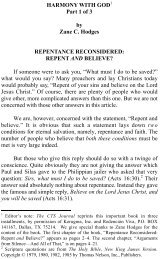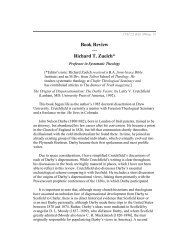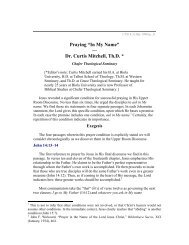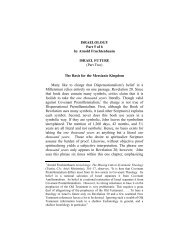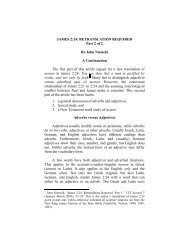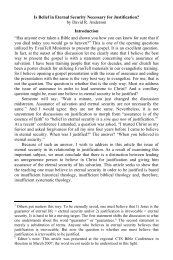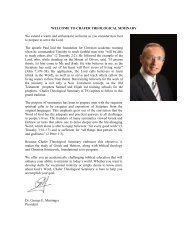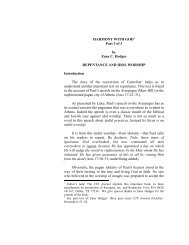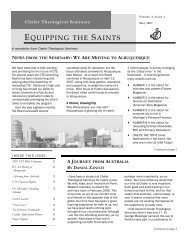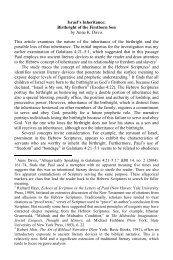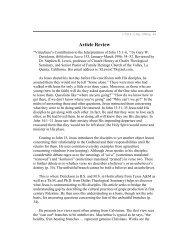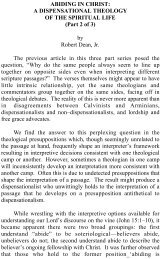Biblical Theology: An Evangelical Approach by David J. MacLeod ...
Biblical Theology: An Evangelical Approach by David J. MacLeod ...
Biblical Theology: An Evangelical Approach by David J. MacLeod ...
Create successful ePaper yourself
Turn your PDF publications into a flip-book with our unique Google optimized e-Paper software.
42CTS Journal 12 (Fall 2006)The present article has been written from the perspective of confessionalor conservative evangelicalism. In a 1978 monograph J. I. Packer argued thatsuch evangelicalism makes four general claims and holds to six fundamentalconvictions: 82 The four claims are: (1) <strong>Evangelical</strong>ism is practicalChristianity, i.e., it is a matter of total discipleship. (2) <strong>Evangelical</strong>ism is pureChristianity, free from accretions and dilutions. (3) <strong>Evangelical</strong>ism is unitiveChristianity; i.e., it seeks to avoid a sectarian spirit. (4) <strong>Evangelical</strong>ism isrational Christianity, as opposed to the popular preoccupation withexperience. The six convictions are the following: (1) the supremacy of HolyScripture (the Bible is the inspired and inerrant Word of God through whichthe Holy Spirit speaks to men’s hearts); (2) the majesty of Jesus Christ (i.e.,the Lord Jesus is God incarnate); (3) the lordship of the Holy Spirit (4) thenecessity of conversion, (5) the priority of evangelism, and (6) the importanceof fellowship in the local church.In light of these claims and convictions it should be apparent that thepractitioner of <strong>Biblical</strong> <strong>Theology</strong> must be an evangelical. He must be born ofthe Spirit of God, since this is a prerequisite to knowing and making use ofdivine revelation (1 Corinthians 2:6–3:4). He must be convinced that theBible is a supernatural, thoroughly reliable book (2 Timothy 3:16–17). Hemust work for the glory of Christ and in dependence upon the illuminatingpower of the Holy Spirit. He must be a growing, maturing Christian, sincematurity is a prerequisite for understanding the “solid food” of the Wordfrom the 1940s to the late 1970s. This group seeks to define evangelical belief interms of biblical doctrine. (2) “Transconfessional” describes another wing of themovement that arose in the 1970s. This element shifted “from confessional substanceto simple, organized fraternity . . . . The importance of theological belief is beingreplaced <strong>by</strong> the importance of effective strategy, proficient fund-raising, and the boldbuilding of personal bases of power and influence.” (3) “Charismatic” includesPentecostal, and non-Pentecostal renewal movements in Protestantism “that are notprimarily theologies. Both arise centrally from a spiritual intuition about the presenceof the Holy Spirit. . . . Here, biblical confession arises not as a thing in itself but as anadjunct to the experience of the Holy Spirit.”81 Wells, “On Being <strong>Evangelical</strong>,” 394.82 J. I. Packer, The <strong>Evangelical</strong> <strong>An</strong>glican Identity Problem: <strong>An</strong> <strong>An</strong>alysis (Oxford:Latimer House, 1978), 15–23. Packer’s exposition of each point should be read. <strong>An</strong>umber of such lists exist today. For example, D. W. Bebbington lists fourcharacteristics that are special marks of conservative evangelicals: (1) Conversionism,i.e., the need to be converted to faith in Christ for salvation, (2) activism, i.e., the needto be involved in the central task of evangelism, (3) biblicism, i.e., a high regard forHoly Scripture, and (4) crucicentrism, i.e., the centrality of the cross and theredemptive work of Christ. See D. W. Bebbington, Evangelism in Modern Britain(London: Unwin Hyman, 1999), 2–3; cf. Alister McGrath, <strong>Evangelical</strong>ism and theFuture of Christianity (Downers Grove: IVP, 1995), 55–56.



